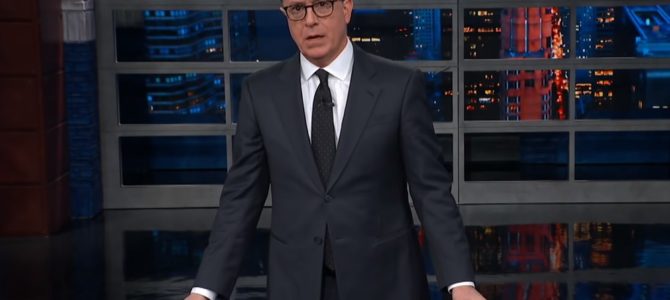It’s getting difficult to use late-night television as a meaningful cultural barometer. As the scattered landscape has viewers increasingly clustered in niches, even institutions like late-night are transforming into platforms for some rather than all.
It seems plausible, for instance, that this clustering process has created a demand for Stephen Colbert’s nightly anti-Trumpism on “The Late Show.” In ratings, how is Colbert, the “most divisive” late-night host, beating Jimmy Fallon, the “most favorable” one?
Colbert saw an uptick when he leaned into anti-Trump politics. But rather than reflecting the mood of the country, as it may have in the past, the correlation between Colbert’s politics and his ratings could simply mean he’s found a sizable niche. That is to say, when all it takes to beat the “Tonight Show” these days is an average of 3.8 million viewers and 692,000 in the demo, hosts can focus on building a niche audience instead of playing to wider one. If you can be the late-night show for Democrats, you don’t have to be the late-night show for everyone.
A Hollywood Reporter-Morning Consult survey released this week (the same source for the numbers on Colbert and Fallon’s favorability) supports this thesis. “Fifty-four percent of Democrats said they watch late-night talk shows, compared to 26 percent of Republicans — and Democrats were more likely than Republicans to say they liked late-night hosts to discuss politics (62 percent) or personal political views (63 percent),” the poll found. That helps explain why Fallon’s broader favorability isn’t translating into higher ratings.
This dovetails with Jay Leno’s contention last week that late-night viewers in the Trump era actually want politically charged programming, no longer craving a break from the news before heading to bed. Colbert’s success makes sense in an environment where late-night viewers are disproportionately Democrats, and those Democrats want politics from their hosts.
This puts Fallon in a strange situation. He could compete with Colbert for the viewership’s large chunk of Democrats jonesing for political content, where Jimmy Kimmel is already finding success. That seems to be Fallon’s current strategy. Or he could lay off politics and make a bid for the smaller share of Republicans and others who prefer the Johnny Carson model. (That could also give viewers who’ve fled today’s politics-heavy late-night for Netflix or on-demand or whatever other option some incentive to return.)
Carson averaged more than 19 million viewers during his final week at the helm of “The Tonight Show.” Like many cultural institutions, late-night used to be a shared experience, forcing entertainers to appeal to a much wider swath of the public. The erosion of those institutions is not a new phenomenon, but it should be a subject of greater focus, and it should also change our perception of late-night.
The president isn’t exactly popular, but rather than suggesting there’s a nationwide appetite for Trump bashing, the trending anti-Trump politics in late-night perhaps suggest there’s a very sizable appetite for it. These trends also reflect a growing reality: we’re clustering in cultural niches tailored to our politics, and losing shared media experiences. Whether that’s ultimately good or bad is another question.









